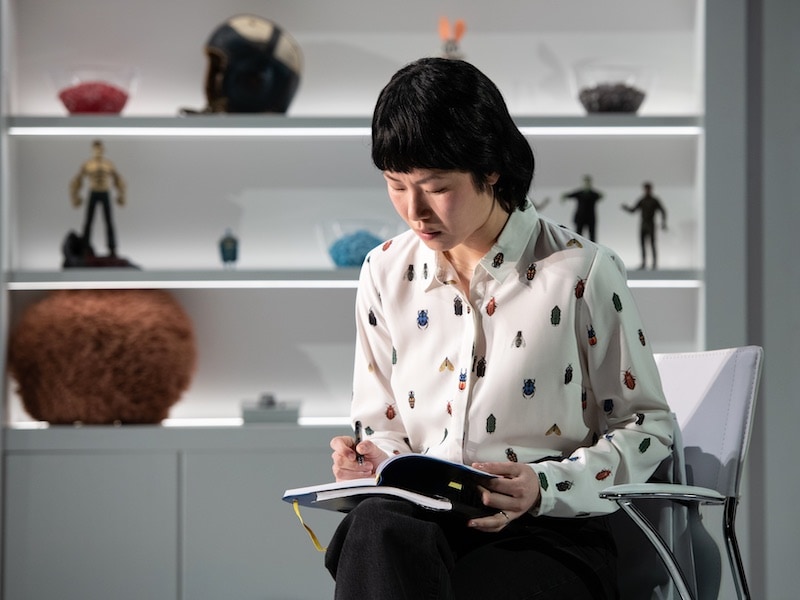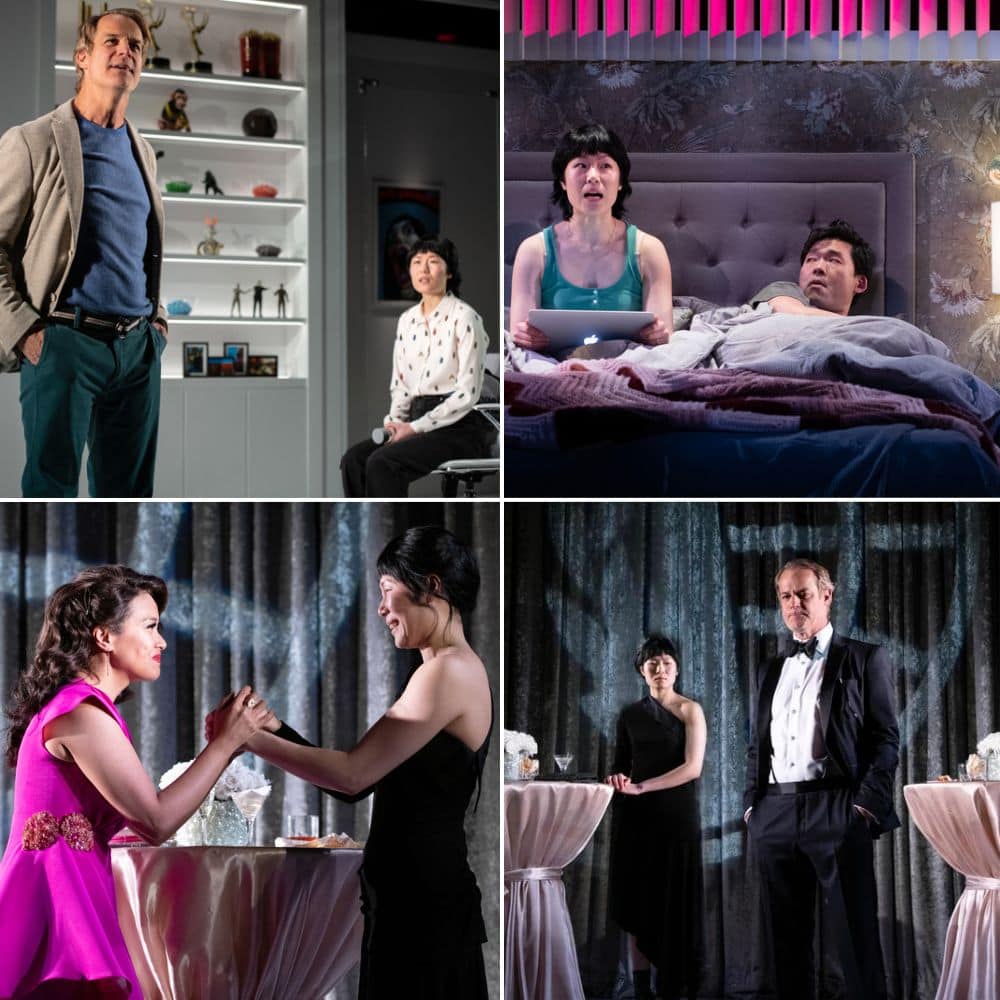Who gets to tell stories, and for what purpose? Those are the key questions animating Kenneth Lin’s Exclusion, now playing in a world premiere at Arena Stage.
Lin’s well-crafted, simultaneously very funny and highly serious, script concerns two related stories. First is the story of pogroms and legislation targeting Chinese immigrants in the late 19th century, which lasted well into the 20th. Second is the story of how that history gets transformed into a commercially successful TV series by today’s entertainment industry.
Both stories have a very specific Los Angeles locale. Katie (Karoline) has written a well-received history of the 1882 Chinese Exclusion Act and events preceding it, focusing on a mass lynching of Chinese immigrants in 1871 Los Angeles. She is working with studio executive Harry (Josh Stamberg) on a fictionalized series based on the book.

We first see them at cross-purposes in Harry’s minimalist modern office, Arnulfo Maldonado’s initial setting for the production. A blown-up poster for Basic Instinct (with Sharon Stone’s larger-than-life legs) looms over Harry’s desk. Katie, nervous, anxious to please, ill at ease as a newcomer to the Hollywood world, wants her draft screenplay for the series to be historically accurate, including a graphic portrayal of the lynching.
Harry pushes Katie to make changes in the script that will please “the network,” such as transforming a doctor murdered in the pogrom into an action hero and making the female lead a prostitute rather than a seamstress. Harry, with his unrelenting surface cheerfulness and casual profanity, dressed in costume designer Sarah Cubbage’s California cool outfit, is a virtuoso of inauthenticity. He is fully aware of his power in the situation.
Trip Cullman’s direction is tight and crisp throughout. In one of his deft touches, Harry stalks around the office, surrounding the seated Katie, laying siege to her concept of the series. The exchange has one well-timed laugh line after another, fulfilling Lin’s aim of “reminding each other to ‘stay living’ [by laughing] together to signal that we’re still game to live together.”
Subsequently, Katie and her husband, Malcolm (Tony Nam), the least thoroughly developed character in Lin’s script, take stock. Katie is troubled by Harry’s desires for the shape of the series. Malcolm, a documentary filmmaker, has a nascent project concerning the role of Chinese workers in building the transcontinental railroad, the financing for which is problematic. Fitting it all together will take time.
Katie then meets with Viola (Michelle Vergara Moore), an Australian actor hired to play the female lead. Viola, thinking it was Katie’s work, has liked Harry’s redraft of Katie’s screenplay, but is impressed with Katie’s argument that the character should be a seamstress rather than a prostitute. The theme of the sexualization of “exotic” Asian women plays strongly in this discussion.
Exclusion is performed without intermission, but its structure feels like that of a two-act piece. At the climax of the first section, the conflict between Harry and Katie about the content of the series comes to a head as Harry baldly exerts his power. Here the double meaning of the play’s title comes into stark relief: it refers not only to the exclusion of Chinese immigrants from the country in the 19th and 20th centuries but also to the exclusion of Asian Americans from positions of influence in telling their story. Ultimately, there are no Asian Americans in the writers’ room for the series.
The second portion of the play shifts to a reception area at a later industry event at which the series, which has become a hit, is to receive several awards, including one for Katie. A bit drunk, Katie remains angry about the outcome of the process that created the series, though she admits to having enjoyed watching some of it.
In one of the most intriguing features of Lin’s script, it is at this point, relatively late in the play, that we learn illuminating facts about the backstories of Katie, Viola, and Harry, clarifying a good deal about their earlier choices.

Katie and Viola connect in a touching exchange in Cantonese that appears to focus on Viola’s children in Australia (there is a lobby placard with a translation that audience members can read after the show). With Katie’s black formal dress, and Viola’s glamorous, flowing pink gown, the scene is also a highlight of Cubbage’s costume design.
Katie has come to appreciate that there is a kind of authenticity in Harry’s construction of the doctor character in the series, reflecting who Harry is as a person. Katie then shows, in a negotiation with Harry, that she has learned a lot about how one acquires clout to tell a story in Hollywood.
The audience applauded during the blackout following the negotiation, at the seeming end of the play. But there’s a coda, designed and lit dramatically in Maldonado’s set for the scene and Adam Honoré’s lighting design, offering hope that, even in commercial entertainment, there is space for telling a horrifying story straight.
The history behind the 19th-century story that Katie wants to tell is itself fascinating (see a brief PBS documentary about the 1871 lynching), and the echo of past anti-Asian bigotry in today’s world is hard to miss. The exploration of power dynamics affecting marginalized groups in the movie and TV business is of equal interest. In an example of how these serious themes can be framed in a highly entertaining package that is greeted by well-deserved audience enthusiasm, Exclusion succeeds on all counts.
Running Time: 90 minutes with no intermission.
Exclusion plays through June 25, 2023, in the Kreeger Theater at Arena Stage, 1101 6th St SW, Washington, DC. Tickets ($56–$95) may be obtained online, by phone at 202-488-3300, or in person at the Sales Office (Tuesday-Sunday, 12-8 p.m.). Arena Stage offers savings programs including “pay your age” tickets for those aged 30 and under, student discounts, and “Southwest Nights” for those living and working in the District’s Southwest neighborhood. To learn more, visit arenastage.org/savings-programs.
The program for Exclusion is online here.
Closed captions are available via the GalaPro app.
COVID Safety: Arena Stage recommends but does not require that patrons wear facial masks in theaters except in occasional mask-required performances. For up-to-date information, visit arenastage.org/safety.




